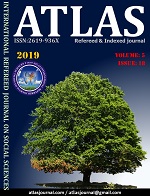EVALUATION OF IMPLEMENTED MONETARY AND FOREİGN EXCHANGE POLICIES AND THEIR EFFECTS FOR TURKEY ECONOMIY
DOI:
https://doi.org/10.31568/atlas.310Keywords:
Money Politics, Exchange Rate Politics, TurkeyAbstract
The Dezenflasyon Program, which was expected to be implemented between the years 2000 and 2002 and described in December, 1998, is a continuation of the Close Monitoring Agreement signed with the IMF in July, 1998. The aim of the program is to reduce the inflation rate, which was 25% at the end of 2000, to 7% in 2002, to decrease the real interest rates to reasonable levels, to increase the growth potential of the economy and to ensure the efficient and fair distribution of the resources of the economy. Economic structure has undergone great change due to the 2001 crisis affecting Turkish economy and stabilization programs implemented. The Program of Transition to Strong Economy was implemented with the support of the IMF and the World Bank in order to mitigate the negative effects of the crisis in February 2001. The biggest feature that differentiates this program from the 2000 Stabilization Program is that it is based on inflation targeting policy with flexible exchange rate regime. It is aimed to increase transparency in the state, to increase competition increasing efficiency in the economy, and to restructure the financial sector with this program. VIII. IX. applied after the 2001 crisis and X. still applied Five-Year Development Plans' main objective is to ensure that inflation complies with EU criteria. In order to achieve these goals, ıt is implemented high interest rate and low exchange rate policy after the crisis. CBRT aims to reach the production level of developed economies with the policies it implements. Turkey has reached the desired growth rate during certain periods with implemented policies. However, fluctuations caused by the world conjuncture has also affected Turkey as each country. Turkey firstly needs to give priority agricultural and service sectors could provide superiority and to increase production of high value-added goods focusing on the industrial sector. This will only be possible by raising the level of knowledge and technology. It will allow the reduction of the unemployment rate in Turkey to increase the level of the technology and to develop new production models in Turkey and it will also enable the level of prosperity and productivity to reach a level that can compete with the foreign markets.
Downloads
Published
How to Cite
Issue
Section
License

This work is licensed under a Creative Commons Attribution-NonCommercial 4.0 International License.


